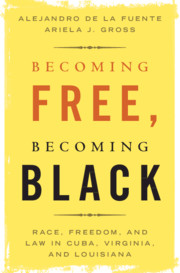Book contents
- Becoming Free, Becoming Black
- Studies In Legal History
- Becoming Free, Becoming Black
- Copyright page
- Contents
- Figures and Tables
- Preface
- Abbreviations
- Introduction
- Chapter 1 “A Negro and by Consequence an Alien”
- Chapter 2 The “Inconvenience” of Black Freedom
- Chapter 3 “The Natural Right of All Mankind”
- Chapter 4 “Rules … for Their Expulsion”
- Chapter 5 “Not of the Same Blood”
- Conclusion
- Notes
- Index
Conclusion
“Home-Born Citizens”: The Significance of Free People of Color
Published online by Cambridge University Press: 16 January 2020
- Becoming Free, Becoming Black
- Studies In Legal History
- Becoming Free, Becoming Black
- Copyright page
- Contents
- Figures and Tables
- Preface
- Abbreviations
- Introduction
- Chapter 1 “A Negro and by Consequence an Alien”
- Chapter 2 The “Inconvenience” of Black Freedom
- Chapter 3 “The Natural Right of All Mankind”
- Chapter 4 “Rules … for Their Expulsion”
- Chapter 5 “Not of the Same Blood”
- Conclusion
- Notes
- Index
Summary
The Conclusion revisits some of the book’s main arguments and notes that although, by the mid-nineteenth century, Cuba, Virginia, and Louisiana were mature slave societies, their racial orders differed in consequential ways. In most parts of Virginia and Louisiana blackness was almost coterminous with enslavement: an enslaved person could live his entire life without ever meeting a free person of color. This was virtually impossible in Cuba, where free people of color represented a significant proportion of the total population. The link between whiteness and citizenship did not crystallize in the same way in Cuba. A free person of color in Cuba could be a rights-bearing subject, participate in public life, and marry across racial lines; on the eve of the Civil War, a person of color in Virginia or Louisiana could do none of those things. Laws regulating free people of color also served as a template for post-emancipation societies seeking ways to degrade black people. Slavery laws did not translate forward in the same way that regulations based on race did.
- Type
- Chapter
- Information
- Becoming Free, Becoming BlackRace, Freedom, and Law in Cuba, Virginia, and Louisiana, pp. 219 - 224Publisher: Cambridge University PressPrint publication year: 2020

